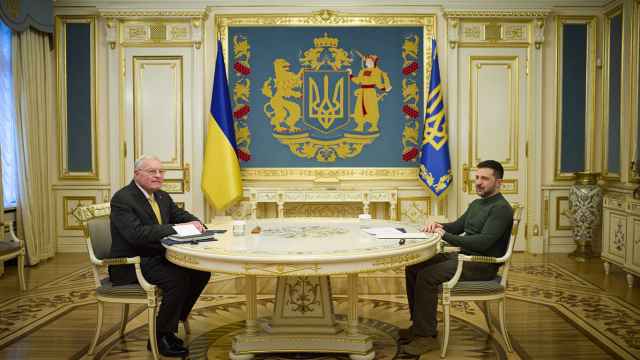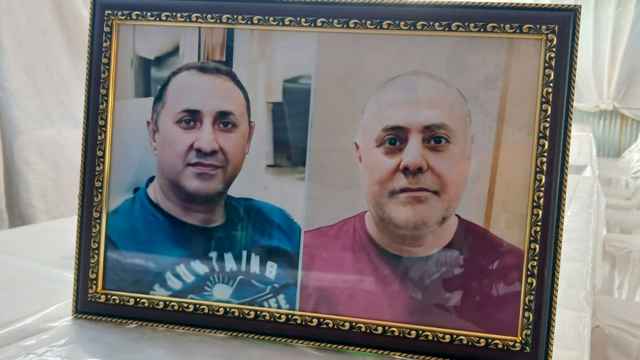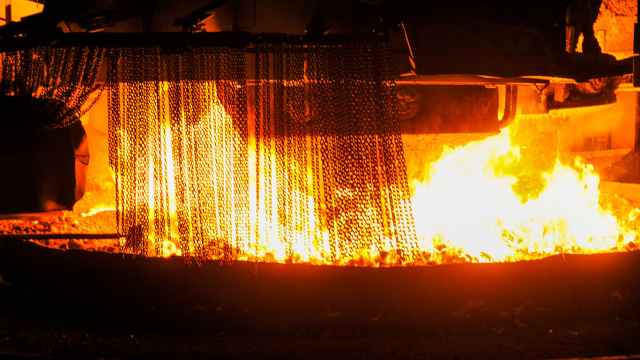The Moscow Times travels across Crimea to gauge the feelings of its residents ahead of Sunday's referendum.
NOVOPAVLOVKA, Ukraine — Two days before the historic Crimea referendum on whether to join Russia, teachers at a school in the village of Pochtovoye, 20 kilometers outside the regional capital Simferopol, were putting finishing touches on their election precinct, polishing transparent ballot boxes with soap.
The boxes bear the coat of arms of the autonomous republic of Crimea, with no sign of Ukrainian insignia anywhere to be seen.
"Everything is almost ready for the vote here," said Svetlana Trukhina, head of the 12028 election commission, in the Soviet-style school gym that hosts the precinct.
Many people and elections experts have cast doubt on whether it is possible to organize a vote in just the two weeks after the referendum was announced by the new government in Crimea. But Trukhina brushed off these concerns.
"The only problem we have is with the voter lists — the first one we received had 1,800 voters, while the final one has only 1,300," she said, adding that "we can register voters here if they show that they live in the area we cover."
Like most people in Crimea at this tense political moment, Trukhina, her colleagues and police officers that guarded the precinct were all reluctant to speak to the media. The police had to call their superiors to ask whether photographs of the polling station could be taken. The police officers said they were loyal to the Crimean government and did not recognize the authorities in Kiev.
Members of the 12018 election commission preparing their precinct for Sunday's vote. (Pascal Dumont for MT)
In central Simferopol on Friday, strong pro-Russia sentiments were on display. Russian patriotic songs played and people stood around holding Russian flags. Ukraine's "trident" coat of arms was taken down from Crimea's Supreme Council building, signaling that the local government has few doubts about the result of Sunday's vote.
Crimea's newly installed leader, Sergei Aksyonov, also expressed confidence that residents would choose to become part of Russia.
"We will have a one-year period of transition until we are integrated into all processes and enjoy all privileges of Russia," Aksyonov said at a news conference.
"Legally I think we will become a part of Russia already next week," Aksyonov said.
It remains unclear, however, how President Vladimir Putin will act given the threat of sanctions by Western governments over Russia's support of Crimea splitting from Ukraine. Foreign Minister Sergei Lavrov and U.S. Secretary of State John Kerry met for talks in London on Friday but apparently reached no resolution to the two sides' differences.
Differences within Crimea were also visible outside Simferopol on Friday, with Ukrainian flags widely on display along some highways, held by people protesting what they called an "illegal referendum."
The central squares in Simferopol have all been secured by pro-Russia militiamen, relegating people with alternative views to less visible areas. Many passers-by honked in support of the pro-Ukraine demonstrators, but there were also many cars with Russian tricolor flags sticking out.
"I never thought that after living for 80 years and suffering one deportation in 1944 I would live through such events," said Ahmed-Kizi Kurdzhian, a member of the local Tatar community.
Ali-Ara Aliyev, the head of a local Tatar elders council, speaking out against what he called the “Russian invasion” of Crimea. (Pascal Dumont for MT)
The referendum has propelled back into the fore many of the ethnic, cultural and political divisions in Crimea that had largely remained in the background since the collapse of the Soviet Union.
The imam at a local mosque in the Fontany district of Simferopol in his Friday sermon called on all Crimean Muslims to "be firm in their faith in these times of great challenges."
"We do not know what the future will bring us, but we have to be strong," he said to dozens of local Muslims.
The imam was reluctant to give an interview and refused to give his last name, saying, "What do you think I should feel when your country has invaded mine?"
The Fontany district is a collection of private houses, many of them half-built, on the outskirts of Simferopol. The area was settled in the early 1990s, when many Tatars were returning after having been deported to Central Asia and Siberia in the Soviet era.
The local elders who form a council, an informal structure that manages community affairs in the district, stayed to pray in a circle after the imam's sermon. "The Sunday referendum makes it a special occasion for us," one of them said.
Ali-Ara Aliyev, 84, the chief of the Fontany elders council, said he wanted to send a message to all Russian people, who he said "do not know the truth due to pervasive propaganda."
"Let us solve our problems by ourselves. We cannot do it in the presence of foreign troops here," he said, surrounded by other elders, who all nodded in support.
A Message from The Moscow Times:
Dear readers,
We are facing unprecedented challenges. Russia's Prosecutor General's Office has designated The Moscow Times as an "undesirable" organization, criminalizing our work and putting our staff at risk of prosecution. This follows our earlier unjust labeling as a "foreign agent."
These actions are direct attempts to silence independent journalism in Russia. The authorities claim our work "discredits the decisions of the Russian leadership." We see things differently: we strive to provide accurate, unbiased reporting on Russia.
We, the journalists of The Moscow Times, refuse to be silenced. But to continue our work, we need your help.
Your support, no matter how small, makes a world of difference. If you can, please support us monthly starting from just $2. It's quick to set up, and every contribution makes a significant impact.
By supporting The Moscow Times, you're defending open, independent journalism in the face of repression. Thank you for standing with us.
Remind me later.





